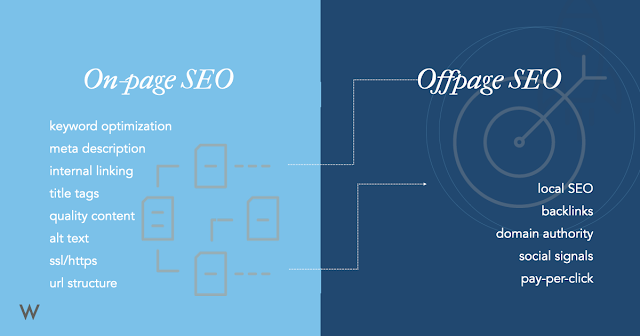Search Engine Optimization (SEO) is a fundamental aspect of digital marketing that helps businesses to improve their visibility in search engine results pages (SERPs). SEO concepts involves various techniques and strategies, which can be broadly categorized into two categories: On-page SEO and Off-page SEO.
Lets take a closer look at the differences between On-page and Off-page SEO and how they contribute to the success of a website.
On-page SEO refers to the optimization of various elements on a website that are directly under the control of the website owner or webmaster. These elements include the content, structure, and design of the website. On the other hand, Off-page SEO refers to the optimization of various external factors that affect the website's ranking in search engines. These external factors include backlinks, social media presence, and other online mentions.
Lets take a closer look at the differences between On-page and Off-page SEO and how they contribute to the success of a website.
On-page SEO
On-page SEO is focused on optimizing the content and structure of a website to make it more search engine friendly. The key elements of On-page SEO include:Content optimization
The content on a website must be optimized for the target audience as well as search engines. This includes optimizing the headlines, subheadings, meta descriptions, and keywords used in the content.URL optimization
The URLs of the website pages must be optimized to make them more user-friendly and readable.Title tag optimization
The title tags on each page must be optimized to include the primary keyword, and it should be no longer than 70 characters.Meta description optimization
The meta descriptions on each page must be optimized to include the primary keyword and should be no longer than 160 characters.Image optimization
The images on the website must be optimized for search engines by using relevant file names, alt tags, and captions.Off-page SEO
Off-page SEO refers to the activities that are performed outside of the website to improve its ranking in search engine results pages. The key elements of Off-page SEO include:Link building
The process of building high-quality backlinks to the website from other authoritative websites. This includes guest blogging, broken link building, and other link building strategies.Social media marketing
The process of promoting the website on various social media platforms to increase its online presence.Online mentions
The process of getting mentions of the website on other online platforms such as forums, Q&A websites, and review sites.Brand building
The process of building the brand name and reputation of the website through various offline and online channels.Both On-page and Off-page SEO are important for improving the visibility and ranking of a website in search engine results pages. On-page SEO focuses on optimizing the content and structure of the website, while Off-page SEO focuses on improving the website's online presence and reputation. By implementing both On-page and Off-page SEO strategies, businesses can improve their website's ranking in search engines and attract more organic traffic to their website.


Comments